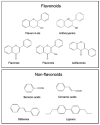Wine, Polyphenols, and Mediterranean Diets. What Else Is There to Say?
- PMID: 34577008
- PMCID: PMC8468969
- DOI: 10.3390/molecules26185537
Wine, Polyphenols, and Mediterranean Diets. What Else Is There to Say?
Abstract
A considerable amount of literature has been published claiming the cardiovascular benefits of moderate (red) wine drinking, which has been considered a distinguishing trait of the Mediterranean diet. Indeed, red wine contains relevant amounts of polyphenols, for which evidence of their biological activity and positive health effects are abundant; however, it is also well-known that alcohol, even at a low level of intake, may have severe consequences for health. Among others, it is directly related to a number of non-communicable diseases, like liver cirrhosis or diverse types of cancer. The IARC classifies alcohol as a Group 1 carcinogen, causally associated with the development of cancers of the upper digestive tract and liver, and, with sufficient evidence, can be positively associated with colorectum and female breast cancer. In these circumstances, it is tricky, if not irresponsible, to spread any message on the benefits of moderate wine drinking, about which no actual consensus exists. It should be further considered that other hallmarks of the Mediterranean diet are the richness in virgin olive oil, fruits, grains, and vegetables, which are also good sources of polyphenols and other phytochemicals, and lack the risks of wine. All of these aspects are reviewed in this article.
Keywords: alcohol; olive oil; phytochemicals; resveratrol; tyrosol.
Conflict of interest statement
The authors declare no conflict of interest.
Figures




References
Publication types
MeSH terms
Substances
Grants and funding
LinkOut - more resources
Full Text Sources

